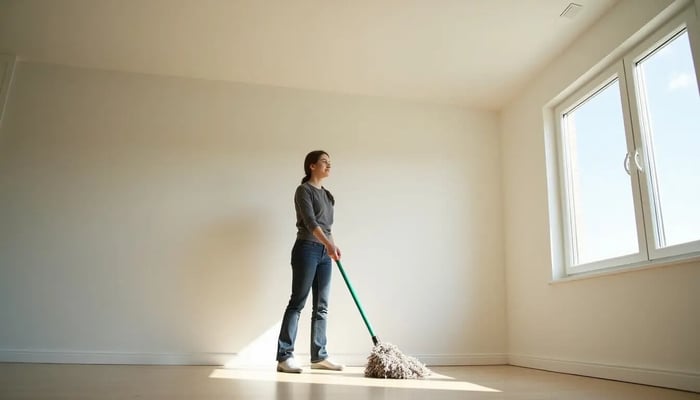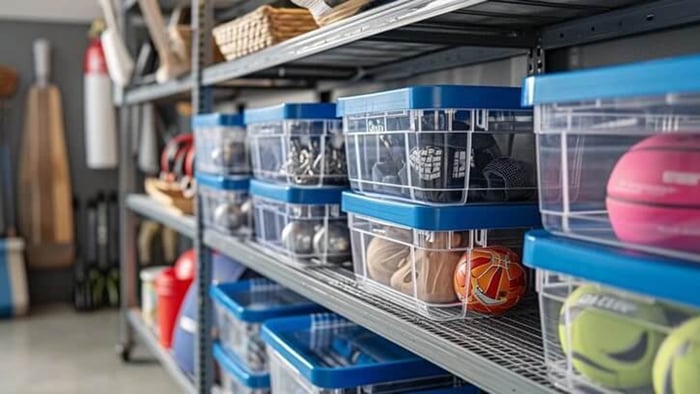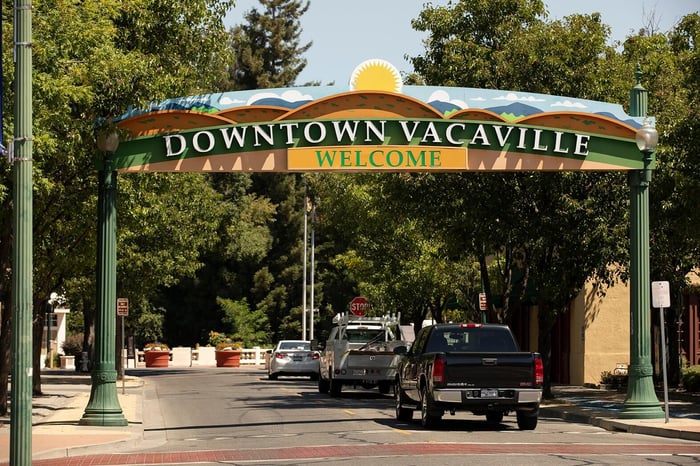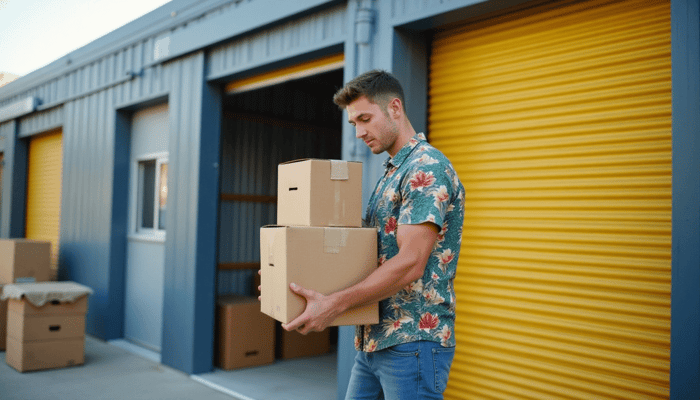Table of Contents
- 1. Choose Your Budget
- 2. Select a Neighborhood
- 3. Determine Your Must-Have Amenities
- 4. Figure Out Parking
- 5. Begin Researching
- 6. Go On an Apartment Tour
- 7. Apply for a Lease
- 8. Purchase Renters' Insurance
- 9. Do an Apartment Inspection Walkthrough
- 10. Read & Sign Your Lease Agreement
- 11. Set Up Your Utilities
- 12. Deep Clean Your Apartment
- 13. Create a New Home Purchase List
- 14. Determine Additional Storage Needs
- FAQs
Are you renting your first apartment? Finding a new apartment can be frustrating, whether you’re ending your four-year run in a dorm or finding a rental space post-breakup or divorce. However, the process does not have to be too time-consuming or difficult. Use our handy first apartment checklist when you’re moving into your new apartment.
1. Choose Your Budget
The number one thing on your first apartment checklist? Setting a budget. This requires careful planning to strike a balance between affordability and comfort.
- Start by calculating your monthly income and following the 30% rule, which suggests allocating no more than 30% of your earnings to rent. Factor in additional expenses such as utilities, renters’ insurance, internet, and groceries to get a complete picture of your cost of living.
- Remember to budget for security deposits, moving costs, self-storage fees, and furniture expenses. These will be unavoidable up-front costs for moving day.
- If you find yourself needing to save more and spend less, consider having a roommate.
Using a budgeting app can help you track expenses and ensure you stay within your financial limits. Experts from Nerdwallet recommend YNAB, Goodbudget, and PocketGuard as top budgeting apps for 2025.

2. Select a Neighborhood
Choosing the right neighborhood for your first apartment is as important as selecting the unit. Some neighborhood considerations for your first apartment checklist include:
- Safety ratings
- Crime rates
- Local amenities (grocery stores, public transportation, healthcare facilities)
- Nearby entertainment (gyms, shopping centers, nightlife, pickleball courts)
- Commute distance to work
- Access to major highways
- Access to public transit
- Parking options
The cost of living, as well as rent, can vary significantly between neighborhoods. A quick Google search and comparison of home prices on Zillow can give you insight into the affordability of an area (even if you’re not buying a home!). Also, compare unit prices on an aggregator like Apartments.com.
You should also visit the areas at different times of the day. This will give you a better idea of traffic patterns, noise, and the direction sunlight will hit the apartment building (key if you work from home and take Zoom calls from your desk!).
3. Determine Your Must-Have Amenities
Apartment complexes vary in what features they offer. Your first apartment checklist should include your apartment must-haves, which may include an on-site gym, pool, clubhouse, business center, or dog park. This list will help you narrow down potential options during the research phase.
4. Figure Out Parking
If you do not rely on mass transit, walking, or biking, another major consideration will be your parking needs. Before researching, answer the following questions:
Do you need a garage?
Do you need one or two outdoor parking spaces?
Are you OK with street parking? Or do you want private parking in a parking lot or driveway?
Do you prefer gated parking or a parking ramp with an access code?
5. Begin Researching
Researching your first apartment online can save time and help you find the best options within your budget. You can start by using apartment listing websites.
Filter your search by price, location, and amenities. Look for features like in-unit laundry, the number of bedrooms, parking, or whether pets are allowed. Consider lease terms such as month-to-month or 12-month leases. Check the security deposit amount and the utilities included. This will help you narrow down your options.
Read reviews from current and past tenants to learn about maintenance responsiveness, noise levels, and landlord reliability. Google and Apartments.com are a treasure trove for reviews.
6. Go On an Apartment Tour
Before signing your lease, you can schedule an apartment tour (either in-person or virtual). We always recommend checking out the unit itself, if possible, and the complex. It's a must for your first apartment checklist!
When touring an apartment, you should ask the leasing agent:
What is the monthly cost, and what are the additional fees?
What utilities are included in the monthly rent fee?
Are there any current move-in promotions or discounts?
What is the typical annual rent increase?
Where are the laundry facilities? (in-unit, shared on-site, or off-site)
Is the apartment pet-friendly?
What is the maintenance policy, and how do you submit a maintenance request?
What is the policy on breaking a lease early?
Are there smoking and non-smoking units?
What parking is available? Where is guest parking?
During an apartment tour, you should also look for signs of property damage. Keep an eye on:
Walls & Ceilings: Cracks, stains, peeling paint, and any signs of water damage
Floor & Rugs: Stains, damage, creaky floorboard, and pet odors
Doors & Windows: All should open easily. Any exterior doors should have proper locks
Garage Door: It should open easily and come with a remote
Lighting & Outlets: Switches should turn lights on/off, and outlets should work. Take a phone charger along with you if you’d like to test out the outlets.
Appliances: Open the appliances to make sure they’re clean and in working order.
Signs of Mold and pests
Noise Level of the building
Trash and recycling dumpsters and proximity to the unit you may be renting
Additional security features around the property, such as a gated entrance or security cameras
7. Apply for a Lease
Before renting, you will most likely need to go through an application process. Many apartment complexes require:
- A valid photo ID
- Proof of employment and/or monthly income
- Proof of renter’s insurance
- A non-refundable application fee (most but not all)
The management company may also perform a credit check when completing your rental application. A credit score may not fully decide if you qualify, but it's a good idea to check your credit report when you start looking for places!
If you plan to park a car on their property, the apartment management may require vehicle information, including your license plate number and registration.
8. Purchase Renters' Insurance
Is it worth getting renters’ insurance? 100%! This is a must for the first apartment checklist!
It’s important to discuss coverage minimums with your landlord, too. Some landlords mandate minimums, such as $20,000 in personal property coverage and $100,000 in liability coverage.
Personal property coverage is essential for you, the renter, as it will protect your possessions from theft, fire, and other natural disasters. Renters' insurance will also significantly reduce the cost of replacing your belongings in these situations.
9. Do an Apartment Inspection Walkthrough
While you may have already inspected the unit during your initial apartment tour, it’s best to check it out again carefully. Identify any damage, maintenance issues, or missing amenities and document them. If anything is broken, stained, or not functioning correctly, take photos or videos and report the problem to the landlord or property manager immediately.
Many apartment complexes ask you to complete a walkthrough checklist before you move in. This formal process will help ensure that you’re not liable for any pre-existing damages and prompt the management team to complete repairs before your move-in date.
10. Read & Sign Your Lease Agreement
Before you sign your lease agreement, read each clause carefully. Make sure you understand your rights and responsibilities as a tenant.
Pay attention to key details such as:
The terms of the lease
Rent due date
Fees for early termination or late payment
Cleaning requirements when you move out
Other policies, such as smoking, guest hours, or using a grill
If your new landlord made any verbal commitments during the walkthrough, ensure you include them in the lease. Lastly, keep a copy of the signed lease for future reference. If the lease is digital, keeping a printed copy on hand is best.
11. Set Up Your Utilities
Ask your new landlord which utilities you need to set up. This includes electric, gas, water, internet, and trash collection.
To get ahead of things, contact the providers early for any service for which you are responsible. Schedule the service activation and have the meters read. Ensure you keep track of your account details and set up your payments.
12. Deep Clean Your Apartment
Before settling into your first apartment, a deep clean ensures a fresh and comfortable start. You can get your cleaning supplies and begin by wiping down all surfaces.
Thoroughly scrub the kitchen and bathroom, paying special attention to appliances, sinks, and floors. Disinfect high-touch areas like doorknobs, light switches, and handles. Vacuum and mop all floors, and consider steam-cleaning carpets if needed.

Before settling into your first apartment, a deep clean ensures a fresh and comfortable start. You can get your cleaning supplies and begin by wiping down all surfaces. Some basic cleaning supplies to bring with you?
Broom and dustpan
Vacuum
Trash bags
Paper towels and cleaning cloths
All-purpose cleaner and window/mirror cleaner
Trash can
Thoroughly scrub the kitchen and bathroom, paying special attention to appliances, sinks, and floors. Disinfect high-touch areas like doorknobs, light switches, and handles. Vacuum and mop all floors, and consider steam cleaning carpets if necessary.
When performing your deep clean, we also recommend having a tool kit on hand. While your landlord should have performed routine maintenance ahead of time, you may need to tighten doorknobs or loose cabinet handles. Having a screwdriver may be quicker than calling the facilities team.
13. Create a New Home Purchase List
If it’s your first time renting, you'll likely need to make some purchases! Here are some top apartment essentials to add to your first apartment checklist:
Kitchen: While your kitchen doesn’t need to be fully stocked, there are some everyday items you’ll need on hand. Our checklist includes: small kitchen appliances (including a coffee maker and toaster), cutting board, chef’s knife, can opener, measuring cups, drying rack, baking sheet, mixing bowls, dish towels, and cooking utensils.
Bathroom: In addition to your toiletries, you may need washcloths, bath towels, hand soap, and a bath mat. Don’t forget your toilet, too! Stock up on toilet paper, a plunger, and a toilet brush.
Bedroom: Kick off life in your new place with fresh bed sheets, pillowcases, and maybe some throw pillows! You may need to purchase furniture, too, so consider adding a bed frame, mattress, and nightstands to your list.
During the chaos of moving, it’s easy to forget some of the other daily essentials. Add these items to your shopping list so you won’t be scrambling for them later:
First Aid Kit, stocked with bandages, antibiotic ointment, and pain relievers
Soap for each bathroom sink and dish soap for your kitchen
Extension cords
An ironing board and iron, or alternatively, a steamer (we love Amazon’s inexpensive hand steamer options - great for home and travel)
Light bulbs and batteries
Laundry essentials, including laundry detergent, fabric softener, and a laundry hamper
14. Determine Additional Storage Needs
Using self-storage when moving into your first apartment can help streamline the transition and organize your space. A household storage unit, particularly a 10x10, is excellent for keeping seasonal items, extra furniture, or things that don’t fit in your new apartment.
If you're looking for more space and need self-storage, look no further than Storage Star! With self storage near you in numerous states, you are sure to find the storage you need - so rent online today!
FAQs
How do I determine my apartment budget?
To determine your budget, calculate 30% of your monthly income. If you follow the 30% rule, you should not allocate more than 30% of your monthly earnings to rent. Make sure you're factoring in additional expenses, such as utilities, renters' insurance, Internet, groceries, and household supplies. This will give you a true picture of your cost of living.
What essential items should I have for my first apartment?
Essential items you will need in your first apartment include:
- Bed
- Bathroom necessities, including towels and toiletries
- Basic cooking supplies, dishes, cups, and flatware
- Standard furniture, such as a couch, desk, desk chair, dining table, and dresser
Prioritize the essential items before you invest in decor.
How can I save money while furnishing my apartment?
Consider buying from budget-friendly stores or purchasing secondhand items. Here are some places where you can find a bargain:
- Facebook Marketplace
- Estate Sales
- Homegoods
- Target
- Amazon
- At Home
- Goodwill & Salvation Army Thrift Shops
- IKEA
Is it necessary to have renters' insurance?
Not all apartments require it, but it's highly recommended. Renters' insurance will protect your personal belongings in case there is a fire, theft, or other disaster. Before moving into your apartment, check if it's a requirement by your landlord.
What should I do if I need more space than my current apartment offers?
If your new apartment doesn't meet your needs, contact your landlord. Some landlords will allow you to switch to another unit if available. IF you're running out of storage space, consider renting a self-storage unit for your extra household items and seasonal belongings.
What should I buy for my new apartment?
Start with must-haves: a mattress and bedding, basic cookware and utensils, a shower curtain and towels, cleaning supplies, and a few extension cords or power strips.
How much should I budget to furnish my first apartment?
Budgets vary, but a minimalist setup typically ranges from $800–$2,500 depending on what you already own and whether you buy new, used, or refurbished.
What do I need to do before move-in?
Set up renters insurance, electricity, water, internet, and any required move-in forms or elevator reservations. Keep your lease, ID, and payment details handy on move-in day.
What items are commonly prohibited in apartments?
Usually grills, space heaters without auto-shutoff, candles, and certain pets or aquariums. Always review your lease and building rules.





